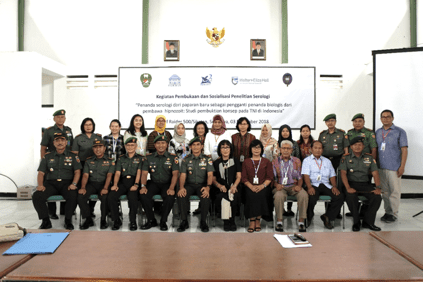Funder
Bill & Melinda Gates Foundation
Principal Investigator
Dr Rintis Noviyanti
Locations
Two sites in East Java, Indonesia
Duration
Dec 4, 2018 – Jul 11, 2022
Recent evidence has demonstrated that acute Plasmodium vivax malaria is not benign as it has been historically considered. This species threatens approximately 2.6 billion people worldwide, with annual clinical cases ranging widely from 12 to 390 million (great uncertainty). The infections frequently cause serious and threatening syndromes like severe anaemia or thrombocytopenia, respiratory distress, renal or hepatic dysfunction, seizures and coma, and circulatory collapse. P. vivax malaria constitutes a serious clinical and public health challenge across much of the globe.
Endemic P. vivax malaria occurs throughout the Indonesian archipelago except in areas located by more than 3000m of altitude, urbanized or most (but not all) areas of Java and Bali. The overall proportion of Plasmodium falciparum: P. vivax among diagnosed and reported cases is about 1:1, and estimates put the number of clinical cases in Indonesia between 5 and 15 million. Thus, each year several million Indonesians require treatment for P. vivax malaria. Both species are known to be highly chloroquine-resistant. The problem of mobile and migrant workers greatly complicates efforts and aspirations for eliminating endemic malaria from Indonesia. Our recent study showed that approximately 17 million Indonesians travel from non-endemic or malaria-free areas to highly endemic areas and then back to their malaria-receptive homes on Java. Cohorts of Indonesian soldiers returning to Java from Papua showed infection rates near 40%, and among those infected by P. vivax, 78% suffered further attacks called relapses.
The prognosis for uncomplicated acute malaria caused by any of the plasmodial species is excellent, with prompt diagnosis and effective treatment. When P. vivax malaria goes undiagnosed and untreated, it often progresses to complicated and threatening disease syndromes that may end in death. Confirmatory diagnosis of P. vivax malaria is almost always made by microscopic examination of Giemsa-stained thick and or thin blood films. Rapid diagnostic tests are available but generally have poor sensitivity for P. vivax malaria. PCR diagnostics are also available, and most of these tests are much more sensitive than microscopy but also far more expensive and require specialized skills and laboratory equipment.
All current diagnostic tests are based on directly detecting parasites or parasite antigens in the blood of a patient suffering an acute febrile illness. There is no test or tool known to be practical in making a diagnosis of latent P. vivax malaria. The hypnozoites in the liver are effectively out of the reach of direct diagnosis. A systematic review and meta-analysis of studies conducted all across the vivax-endemic globe showed that >80% of clinical attacks by this species originated as activated latency rather than mosquito bites. It is, therefore, very important to be able to identify and treat silent and invisible carriers of hepatic hypnozoites.
The primary objective of the study is to validate a serodiagnostic test for recent infection with P. vivax as an indication of the high probability of hypnozoite carriage. The study employs soldier volunteers returning to a malaria-free base on Java after months of exposure in malarious eastern Indonesia; serodiagnostic screening upon return with months of follow-up to ascertain hypnozoite carriage status at enrollment and screening.
This cohort study screened and enrolled soldiers returning from moderately endemic malaria areas in Papua to East Java (battalion 1 at Surabaya from Dec 4, 2018, to Jun 21, 2019, and battalion 2 at Malang from Jan 13, 2022, to Jul 11, 2022). Ethics approval was obtained from the local ethics committee (EIREC No. 123, dated Oct 18, 2018, and EIREC No. 171 dated Dec 31, 2021).

Following a nine-month deployment to South and North Papua, the soldiers returned to their bases after two weeks of leave. They were actively screened for malaria; 616 soldiers from two battalions were screened, and 574 did not have patent infections of any malaria. Those negative were invited to be serologically screened and followed for 24 weeks.
A total of 294 soldiers from battalion 1 were enrolled in the study in December 2018, of which 24 relapsed during follow-up. Another 45 non-relapsing soldiers were detected by PCR and serology at Eijkman Institute for Molecular Biology, Jakarta. Soldiers who relapsed had higher median antibody titers for several of the biomarkers compared to those who did not relapse. The diagnostic tool had 75% sensitivity and 93% specificity in identifying future relapses using blood samples from recruitment day. Recurrent infections strongly boosted antibody titres both in seropositive and initially seronegative soldiers. This study demonstrates that serological markers can identify people at risk of P. vivax relapses.
A total of 280 soldiers from battalion 2 were recruited in January 2022, of which 83 relapsed once, and 36 had more than one relapse during a 6-month of follow-up. Laboratory analysis of these samples is in progress.
Validation of this serological screen for hypnozoite carriage would have far-reaching implications for the strategies now employed for rolling out presumptive, targeted, radical cure of vivax malaria as a tool for eliminating its transmission. The standard therapy is toxic to patients with G6PD deficiency and cannot be practically administered en masse. This diagnostic would allow screening en masse and therapy directed to those most likely to be carrying hypnozoites.
The study team frequently conducted out-of-base bi-weekly follow-ups due to military temporary duty or training among study participants.